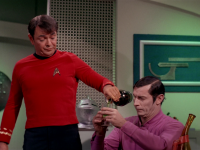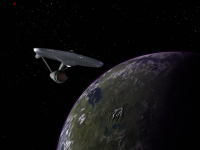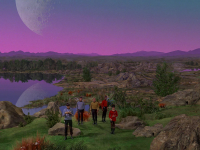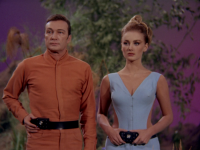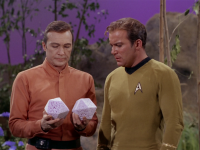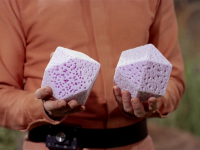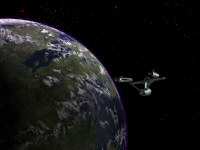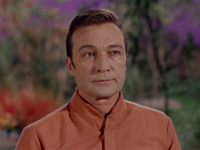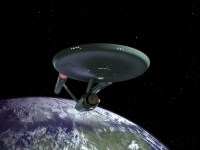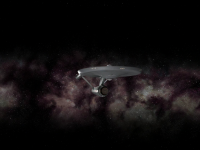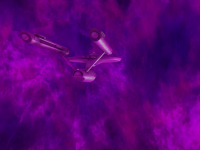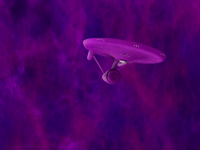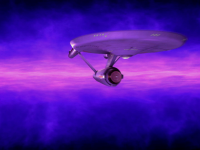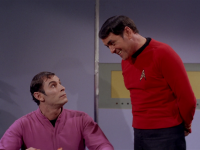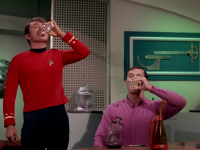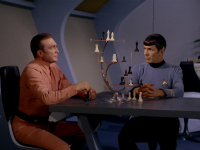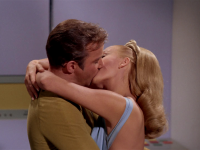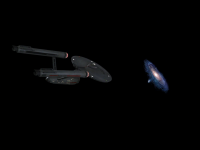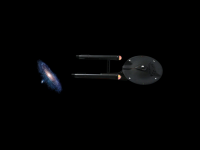Star Trek: The Original Series — 2x22 — By Any Other Name
Synopsis
Extra-galactic beings commandeer the Enterprise in an attempt to return home.
Filler rating: good filler
There's no essential plot or exposition in this episode that renders it unskippable, but it's definitely a great story nevertheless.
Remarkable scenes
- The aliens thanking Kirk for responding to their distress call and then immediately demanding that Kirk surrender his vessel to them.
- Yeoman Thompson getting killed by the belt weapon.
- Kirk: "Immense beings with 100 tentacles would have difficulty with the turbolift."
- Spock trancing himself into being sick suddenly and all too authentically.
- Spock and Scotty proposing self destructing the ship to stop the Kelvans.
- Rojan announcing that he will execute Kirk's entire crew shortly after they traversed the barrier.
- Scotty's drinking scenes with the Kelvan.
- Spock defeating a Kelvan at chess.
- Scotty: "It's uh... it's green!"
- Spock: "Rojan, you are only a link in a chain following an order given 300 years ago. This is an opportunity for you to establish a destiny of your own."
Review
Romeo and Juliet, Act II, Scene 2 sports the following iconic line: "What's in a name? That which we call a rose by any other name would smell as sweet." The episode's namesake Shakespeare reference is a metaphor for the fact that while the Kelvans may continue to call themselves Kelvan, they've chosen to take human form and in so doing they are inevitably forced into the totality of the human experience. They begin taking on all characteristics of humanity, including those that they did not expect to adopt, like love, jealousy, and ultimately compassion.
The metaphor is a bit forced and backward given that it is usually meant to convey the idea that language can change our perception of things, but perception is subjective and all things have some objective characteristics which cannot be altered by language. Given that, one would expect the metaphor to work in reverse on the Kelvans and produce the opposite effect on the story. A more traditional interpretation of the metaphor would have left the Kelvans incapable of experiencing what it is to be human because even though they've taken on the appearance of humanity, they cannot fundamentally change who and what they are.
But setting aside literary quibbling for a moment, this is still a terrific story with well conceived science fiction elements. Due to some kind of increasing galactic radiation in the Andromeda galaxy, the Kelvans who are native to the area are preparing to flee their home due to its impending uninhabitability. The next closest galaxy is the Milky Way and they intend to conquer it by force. This is perhaps one of the most epic premises upon which an episode of Star Trek has been built so far and the plot fully explores all the implications of such a grandiose premise.
I can't say I'm happy to see the return of giant energy barrier at the edge of the galaxy which was originally featured in Where No Man Has Gone Before, but at the same time I suppose I'd have been more annoyed if it were conspicuously missing from the episode, as that would have simply been a continuity error. The writing of this episode responsibly deals with its canonical existence and even uses it quite cleverly as a plot device while tactfully not dwelling on the reason for its existence or exploring how it came to be. I'd still like to see an episode dealing with why it's there at some point, but the crisis situation in this episode simply precluded that.
Speaking of long standing issues with the realism of the science fiction on Star Trek, this episode gives us new exposition which either clarifies or complicates the problem concerning why so many aliens in the Milky Way look like humans. It's explicitly stated in this episode that chances are very much against the idea of another alien race evolving to look like humans in the Andromeda galaxy. This implies that there is an extraordinary reason for why so many aliens look like humans in the Milky Way, such as the common genetic heritage hypothesis I outlined in my review of Return to Tomorrow.
Moving onto the actual story, there's a great deal of dramatic detail to praise. For one, while I'm not one to comment much on TV trends regarding gender and racial issues, I was pleasantly surprised to see that given the choice to execute a white girl or a black man, the plot bucked the typical trend by choosing to off the white girl. I also quite enjoyed Kirk's line to Rojan claiming that the Federation has handled foreign invaders before. That threat felt more like posturing than substance; a nice piece of subtle acting from William Shatner.
Perhaps the best dramatic moment of the episode is when Kirk struggles with whether or not to self destruct the ship, ultimately choking on the decision; being unable to go through with it. In my view what we see here is a rare moment of weakness in Kirk. In that moment he had an opportunity to sacrifice his ship to protect the entire galaxy from a formidable threat, but something prevented him from being able to give the order. My suspicion is somewhere in the back of his mind he remained confident that he could thwart the Kelvan threat without destroying himself in the process. This confidence may well have been hubris, or perhaps in that moment Kirk simply feared death and couldn't bring himself to give an order that would take his life and the lives of everyone under his command.
However Kirk arrived at his decision, it ended up being the right course of action. Amusingly, the Kelvans had detected Spock's and Scotty's subterfuge and could have prevented the self destruct if necessary, so all of Kirk's fretting was for nothing. But that removes none of the suspense from the moment, since there's no way Kirk could have known that at the time. After the ship cleared the Milky Way, Kirk seemed to waste no time finding the most beautiful woman in the episode to seduce, as usual. Meanwhile, Scotty's quest to drink a Kelvan under the table provided perhaps the most entertaining scenes of the episode.
Ultimately the resolution of the story was both a piece of clever writing exploring the idea that the Kelvans could be exploited by their newfound humanity as well as true to the spirit of Star Trek in that Kirk refused to abandon his peace proposal throughout the perilous conquest of the Enterprise. The story ends on a note indicating that automated vessels will be sent to the Kelvan homeworld to propose Kirk's peaceful solution, but I have my doubts about that plan's potential for success, even with an endorsement from real, live Kelvans since it is well established that these Kelvans arrived on a generational ship, disconnected completely from a home they never knew.
All in all, this episode has sequel written all over it. I'd love to see a future Star Trek production tackle the return of the Kelvans some time later after having received the message, still bent on conquest. Since few episodes of Star Trek leave me wanting to see more of the aliens of the week, I'd say this episode has earned itself a well deserved place in the above average episodes club.
